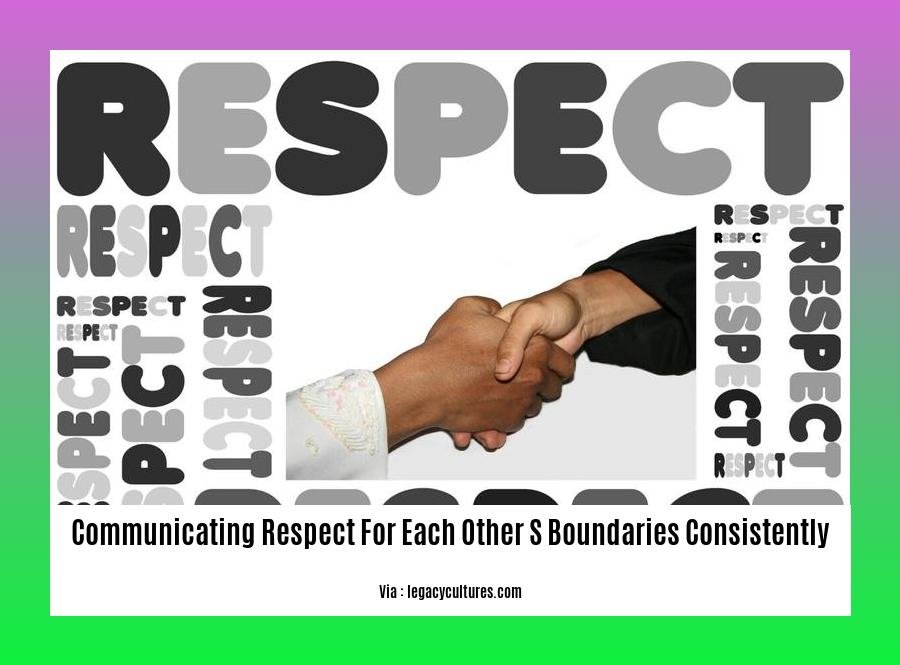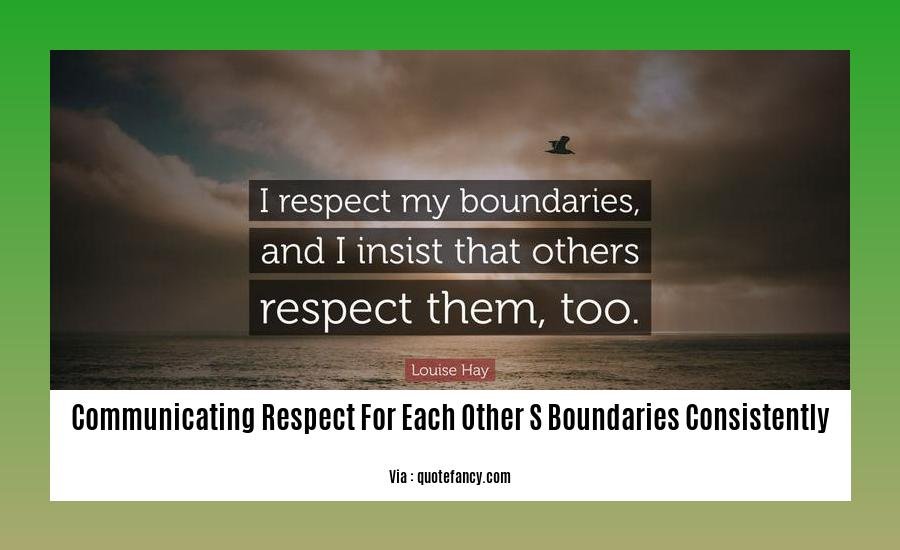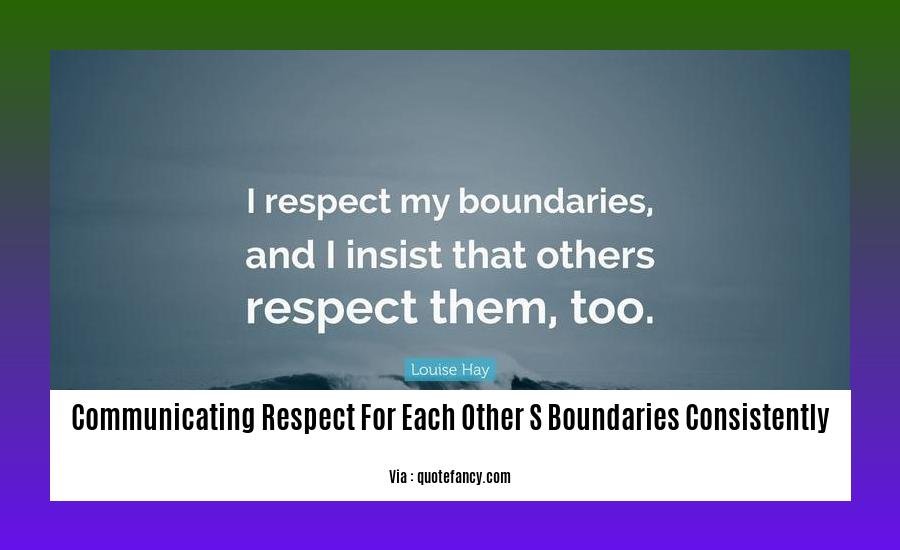In the professional realm, where collaboration and interpersonal dynamics intertwine, the significance of adhering to boundaries cannot be overstated. Fostering Workplace Harmony: Communicating Respect for Each Other’s Boundaries Consistently delves into the nuances of boundary communication, emphasizing the cornerstone principles of respecting personal and professional limits. By navigating the intricacies of boundary setting, conflict resolution, and effective communication, this article empowers individuals and teams to establish a work environment characterized by mutual respect and understanding.
Key Takeaways:

- Communicate openly and honestly: Express your perspectives and needs directly, and listen actively to understand others’ views.
- Respect your own rights and boundaries: Value yourself and your rights, acknowledging that you cannot control others’ actions.
- Establish clear boundaries: Communicate your limits respectfully, and respect the boundaries of others.
- Express your feelings within boundaries: Voice your concerns and needs within the established boundaries.
Communicating Respect for Each Other’s Boundaries Consistently
Respecting each other’s boundaries is pivotal for a harmonious and professional workplace. Here’s an instructional guide:
Establish Boundaries
- Clearly define your comfort zones and limits.
- Communicate these boundaries openly and honestly.
- Use “I” statements to express your needs and preferences.
- Respect the boundaries of others even if they differ from your own.
Listen Actively
- Pay attention to what others are saying and understand their perspectives.
- Don’t interrupt; instead, ask clarifying questions.
- Show empathy by trying to see the situation from their point of view.
- Avoid making assumptions or judgments.
Assertiveness
- Express your feelings and opinions calmly and respectfully.
- State your needs and requests directly but politely.
- Set limits when necessary and don’t apologize for doing so.
- Use “no” when you need to, and don’t be afraid to repeat yourself.
Conflict Resolution
- Address conflicts promptly and respectfully.
- Focus on finding a mutually acceptable solution.
- Practice active listening and seek common ground.
- Seek professional help if necessary to facilitate a resolution.
Benefits of Boundaries
- Reduced stress and anxiety
- Improved communication
- Increased trust and respect
- Enhanced productivity and performance
- Healthy and supportive work environment
Remember, communicating respect for each other’s boundaries consistently is an ongoing effort that requires open communication and a commitment to creating a respectful and inclusive workplace.
Learn ways to reaffirm the importance of stated boundaries through words and communicate care for limits even through disagreement by approaching boundary discussions with empathy.
The Role of Empathy in Respecting Boundaries
Empathy is like stepping into someone else’s shoes, understanding their feelings, and respecting their limits. When you show empathy, you’re more likely to:
- Build Trust: Empathy shows others that you care about their well-being, creating a foundation of trust and understanding.
- Prevent Conflict: By considering others’ perspectives, you can avoid misunderstandings and disagreements that stem from boundary violations.
- Foster Respect: Empathy helps you value individual differences and recognize the importance of respecting the needs and limits of others.
5 Ways to Show Empathy and Respect Boundaries:
- Active Listening: Listen attentively to others, trying to understand their thoughts and feelings without judgment.
- Ask Clarifying Questions: Show that you’re engaged by asking questions that demonstrate your understanding and respect for their boundaries.
- Respect Nonverbal Cues: Pay attention to body language and tone of voice, as these can indicate discomfort or boundary violations.
- Acknowledge Boundaries: Verbalize your understanding and respect for others’ limits, ensuring they feel heard and valued.
- Adjust Your Behavior: When you realize you’ve crossed a boundary, apologize and make a conscious effort to adjust your behavior respectfully.
Key Takeaways:
- Empathy fosters understanding and respect for others’ boundaries.
- Respecting boundaries builds trust and creates a harmonious environment.
- Actively listening, asking clarifying questions, and respecting nonverbal cues demonstrate empathy and boundary respect.
- Acknowledging and adjusting your behavior when you cross boundaries is crucial.
Source: Understanding and Respecting Boundaries: 9 Tips for Honoring Others, Lovediscovery
Why is Understanding Others’ Boundaries So Crucial in Relationships?
Have you ever been in a situation where someone has crossed your boundaries, making you feel uncomfortable or disrespected? Understanding and respecting others’ boundaries is essential for maintaining healthy relationships. Here’s why:
Builds Trust and Respect
Healthy relationships are built on trust and respect. When you respect someone’s boundaries, you show them that you value their needs and individuality. This fosters a sense of safety and understanding, allowing relationships to thrive.
Promotes Healthy Communication
Clear communication is key to boundary setting. By openly discussing your needs and respecting the boundaries of others, you create a safe and respectful space for communication. This prevents misunderstandings, conflicts, and resentment.
Protects Emotional Well-being
Disregarding others’ boundaries can have a negative impact on their emotional well-being. It can lead to feelings of disrespect, anxiety, and even depression. By understanding and respecting boundaries, you create an environment where people feel valued and supported.
Key Takeaways:
- Respecting others’ boundaries fosters trust, respect, and healthy communication.
- Disregarding boundaries can harm emotional well-being and damage relationships.
- Clear communication is crucial for understanding and respecting boundaries.
Citation:
- How to Respect Other People’s Boundaries











